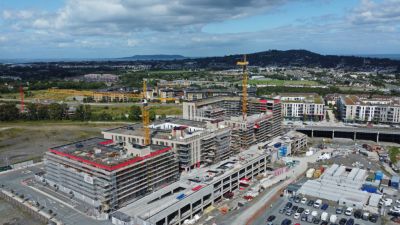The Government has been told that a report which shows that rents in existing tenancies across the country grew by 5.2 per cent is evidence of “flagrant breaches” of rules designed to cap rates in certain urban areas.
The Q3 2023 rent index report from the Residential Tenancies Board (RTB) showed that the average rent for new tenancies was €1,598 – 17.7 per cent higher than the 1,357 average rent for existing tenancies.
It also found that there was an 11% year-on-year increase on rates for new tenancies and a 5.2 per cent increase for rents in existing tenancies.
In certain designated areas, rents cannot be increased by more than two per cent per year – or by the rate of inflation, whichever is lower.

These rent pressure zones (RPZs) are enforced where rents are highest and where households have the greatest difficulty finding affordable accommodation.
During Leaders’ Questions on Thursday, Sinn Féin finance spokesperson Pearse Doherty said the RTB report showed renters are being “fleeced” in every county across Ireland.
Mr Doherty said rents have increased by 30 per cent over the lifetime of the current Government and the average renter now pays €4,500 more per year than they did four years ago.
He said the report shows rents are “continuing to spiral out of control” and that many young people are choosing to emigrate for better opportunities.
Mr Doherty said Sinn Féin wants to “protect renters” by banning increases for three years and returning a month’s rent back to their pockets.
He added that the party would also implement policies to dramatically increase the supply of affordable and cost-rental homes.
He said average rents had increased by more than double the RPZ cap in many counties where the limit exists.
Labour leader Ivana Bacik also said there was clearly an issue with “flagrant breaches” of RPZs.

She said the report showed that the Government had failed in its duty to ensure people have secure and affordable housing.
She added that high rents had serious knock-on effects including “plunging people into poverty and harming health”.
Representing the Government, finance minister Michael McGrath said the RTB report is not a measure of RPZ compliance.
The RTB said the report cannot be used in that manner, he said, as it is based on a standardised average in each region and that RPZ limits do not apply to whole counties.

Mr McGrath said the RTB has been given more funding and is active in investigating compliance with RPZs.
He told the Dail: “Fundamentally, the reason why rents are continuing to rise is because there is a mismatch between supply and demand. That is the reality.
“But when you look at the activity rate, we are unquestionably now making very significant progress.
“There is real momentum in homebuilding across the country. 32,700 homes built last year – that was a 10 per cent improvement on 2022 and well ahead of the Housing For All target.”

On the subject of implementing Sinn Féin’s proposed three-year rent freeze, Mr McGrath claimed this would negatively impact the supply of new homes.
“We are likely, over the period ahead, to revise upwards the housing targets in Housing for All and that will mean much more capital needed, perhaps up to €20 billion a year on average over the next number of years to build the homes that we need.
“And you are seeking to create an environment that is unfriendly to that investment that will result in that investment stalling and that ultimately will impact on supply of homes.”







